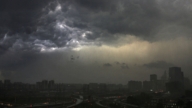【新唐人2013年09月27日訊】來自大陸的消息說,浙江省溫州市房價近兩年來持續下跌,甚至部分樓盤出現超過50%的跌幅,不少業主因此被迫斷供,棄房逃生。經溫州市銀監局證實,「斷供房」和「棄房」現象確實存在。當地市民也表示,溫州棄房現象已經非常嚴重。專家認為,溫州「斷供房」現象是大陸各地樓市危機的先兆,一旦大面積爆發,將導致大陸房產泡沫破裂甚至引發全面金融危機。
近期,業界瘋傳浙江溫州因樓價暴跌而出現房屋斷供被棄。大陸多家媒體紛紛報導。今年8月以來,溫州市場被爆出的斷供商品房已經達到15000套。對此,溫州市銀監局表示,實際總數只有595套,風險是總體可控的。但這個說法遭到了溫州市民的反駁。
浙江省溫州市居民陳宗瑤:「溫州房價一直在下跌,就是房子沒人要,溫州扔給銀行的房子最少是一萬套以上,不會少於這個數字,不可能只有500套的。但是政府還在操作,開發商還在操作、還在宣傳,意思說房價還很好、房市很好,其實呢,很不樂觀,房子根本就沒人要。」
斷供,是指個人或企業向銀行申請貸款買房後,因各種原因無法按期償還貸款而停止供應貸款樓的現象。分析認為,溫州持續暴跌的房價使得溫州人高價貸款購買的房子,現在全部成為了負資產,他們所欠銀行的購房貸款金額,遠遠超過了房子目前能賣出的市場價,因此很多人被迫選擇了斷供和棄房。
陳宗瑤:「這些房主,房子就不要了,就交給銀行了,意思說,如果我現在把房貸付了,我還不夠買這些房子,那大不了還是不要了,把以前的這些款項付了,就算了,寧可賠以前的房子。」
中國指數研究院在溫州抽樣的樣本顯示,2012年僅1月到8月期間,溫州平均樓價就從每平方米2萬元跌到1萬5千元,跌幅達到了25.9%。甚至部分樓盤的價格下跌50%,慘遭「腰斬」。
面對下跌的房價和大量無人問津的「斷供房」,溫州政府選擇了放棄限購政策,允許當地居民購買兩套房屋,這一舉動被業界認為是與中國的房價調控政策背道而馳,但實施了一個多月,至今仍然沒有被叫停,顯然已經得到了中央的默許。
陳宗瑤:「政府可能不願意把它跌下去,因為跌下去以後可能對各方面有些動盪,開發商現在和政府只能把房價挺住,因為中國政府現在它們的GDP也就是靠房地產或者是征地啊、強征或強拆,所以它必須把房地產給撐住。」
然而,溫州政府對限購令的「鬆綁」並沒有得到預期的效果,溫州房價下跌依舊。雖然中共國家統計局強調,溫州是大陸70個大中城市裡面,唯一一個房價下跌的城市,但專家認為這種說法並不符實。
金融分析師任中道:「因為大陸的學者也好,還有海外的媒體也說了,二、三線城市空城、鬼城已經遍地了,上百個城市都是這種狀態,從衛星的圖片上來看,從大陸媒體實例報導上來看,它不是一個獨有現象,是一個普遍現象。這只是一個先兆,一個苗頭,陸續還會有這樣的事情會發生。」
另據中共喉舌央視《經濟半小時》報導,深圳近兩年也出現了同樣的斷供潮。
陳宗瑤:「全國各地其實很多地方已經發生了,包括我有些親戚朋友,在外面買了房子搞投資的,現在想拋出去都沒人要,不管賠多少它都沒人要。現在整個房市已經影響全國了,不可能只有溫州。」
目前,專家紛紛預測,房價下跌以及斷供潮將有可能逐漸席捲全國,引發金融風暴。萬科董事長王石9月份連續三次通過微博警告百姓警惕房地產泡沫,可見大陸房地產現狀真的已經到了非常危險的程度。
採訪編輯/張天宇 後製/陳建銘
As Wenzhou House Prices Plunge, Owners Abandon Mortgages
News from the China says house prices in Wenzhou City,
Zhejiang Province, continue to drop,
with some real estate properties dropping more than 50%,
making many owners feel compelled to stop paying mortgage,
abandon the properties and run away.
The Wenzhou City Banking Bureau confirmed this phenomenon.
Local people also say this phenomenon is very serious.
Experts say that it’s a signal of China’s real estate crisis,
and that its expansion will lead the real estate bubble to burst
and maybe even a full-blown financial crisis.
The realty market crash and foreclosures in Wenzhou City,
Zhenjiang Province, has frequently been in Chinese media lately.
Since August this year, some 15,000 units
have been said to go into foreclosure.
The Wenzhou Banking Bureau says that the actual number
is only 595 units, and that the overall risk is controllable.
However, this statement was refuted by people in Wenzhou.
Wenzhou resident Cheng Zongyao:"Housing prices here
have been on the decline, as no one wants these units.
At least 10,000 units have been foreclosed.
It couldn’t have been only 500.
But the government is still manipulating the market,
developers are still operating and advertising a good market.
Actually, it is not optimistic at all.
The houses are simply unwanted."
Analysts say the continued slump in Wenzhou’s real estate
leads to negative assets for those who bought high priced houses.
The money they owe the banks is much higher than
the market prices of the houses.
So many people have been forced into foreclosure.
Chen Zongyao:"These home owners abandoned the properties.
They gave it back to the bank and abandon the house.
They’d rather lose the money they paid before."
A sample from the China Index Academy’s survey in Wenzhou
shows that from January to August of 2012,
the average of property prices in Wenzhou dropped by 25.9%
from 20,000 yuan per square meter to 15,000 per square meter.
Some properties even fell by 50%.
Facing falling home prices and a large amount of foreclosures,
Wenzhou government released a purchase restriction policy,
allowing local residents to buy only two houses.
This move goes opposite to China’s price control policy.
It has been implemented more than a month, and no one yet
has called for it to stop.
Apparently it has been approved by the central government.
Chen Zongyao:"The government might not want prices to fall,
in fear of turmoil.
Developers and the government can only keep the prices stable.
China’s GDP depends on real estate, land occupation and
forced demolition, so they have to bolster the price."
However, the government’s restriction on purchases
did not have the expected results.
Wenzhou’s house prices continue to decline.
Although China’s National Bureau of Statistics emphasizes
that Wenzhou is the only one in the top 70 Chinese cities
with falling house prices, experts say this statement is not true.
Financial analyst Ren Zhongdao:"Chinese scholars and
overseas media report that China has many
second-level and third-level empty cities or 'ghost cities.'
Hundreds of cities are like that.
It is not an issue of individual cities. It is a common issue.
It is a signal that more such crises will occur."
According to Chinese Communist Party (CCP) mouthpiece
CCTV’s Economic Half-Hour,
a similar wave of foreclosures also happened in Shenzhen.
Chen Zongyao: “It has happened in many places across China.
Some of my family and friends are also facing this issue.
They bought houses for investment,
but no one wants to buy from them now.
This phenomenon is impacting the whole country,
not only Wenzhou."
Currently experts predict that declining house prices
and foreclosures could gradually sweep across China,
causing a financial storm.
In September, Wang Shi, chairman of Vanke, warned people
three times via his Weibo, about the potential housing bubble.
It can be seen that China’s real estate situation
is already at very dangerous point.
NTD report Zhang Tianyu



























